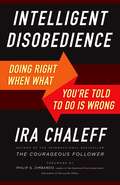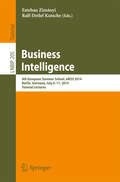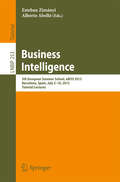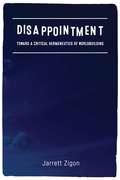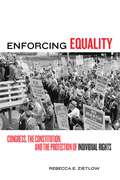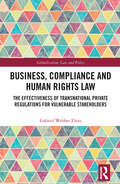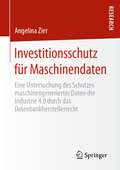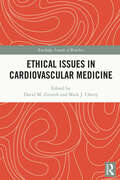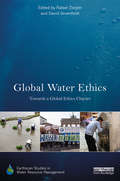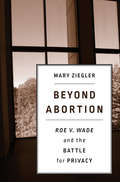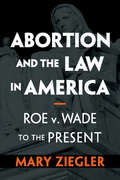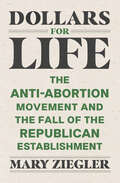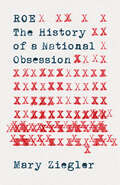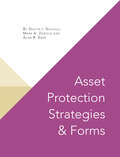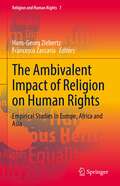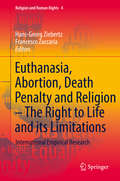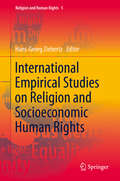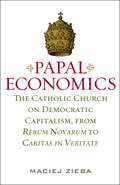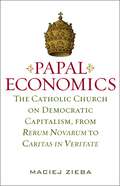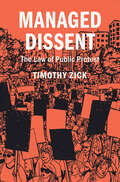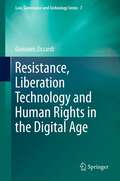- Table View
- List View
Intelligent Disobedience
by Philip Zimbardo Ira ChaleffWhen It's Smart to Say NoNearly every week we read about a tragedy or scandal that could have been prevented if individuals had said no to ill-advised or illegitimate orders. In this timely book, Ira Chaleff explores when and how to disobey inappropriate orders, reduce unacceptable risk, and find better ways to achieve legitimate goals.The inspiration for the book, and its title, comes from the concept of intelligent disobedience used in guide dog training. Guide dogs must recognize and resist a command that would put their human and themselves at risk and identify safer options for achieving the goal. This is precisely what Chaleff helps humans do. Using both deeply disturbing and uplifting examples, as well as critical but largely forgotten research, he shows how to create a culture where, rather than "just following orders," people hold themselves accountable to do the right thing, always.
Business Intelligence: 4th European Summer School, eBISS 2014, Berlin, Germany, July 6-11, 2014, Tutorial Lectures (Lecture Notes in Business Information Processing #205)
by Esteban Zimányi Ralf-Detlef KutscheThis book constitutes the tutorial lectures of the 4th European Business Intelligence Summer School, eBISS 2014, held in Berlin, Germany, in July 2014. The tutorials presented here in an extended and refined format were given by renowned experts and cover topics including requirements engineering for decision-support systems, visual analytics of large data sets, linked data and semantic technologies, supervised classification on data streams, and knowledge reuse in large organizations.
Business Intelligence: 5th European Summer School, eBISS 2015, Barcelona, Spain, July 5-10, 2015, Tutorial Lectures (Lecture Notes in Business Information Processing #253)
by Esteban Zimányi Alberto AbellóThis book constitutes the tutorial lectures of the 5th European Business Intelligence Summer School, eBISS 2015, held in Barcelona, Spain, in July 2015. The tutorials presented here in an extended and refined format were given by renowned experts and cover topics including schema evolution for databases and data warehouses, publishing OLAP cubes on the Semantic Web, design issues in social business intelligence projects, context-aware business intelligence, and key performance indicators in data warehouses.
Medical Research Ethics: Challenges in the 21st Century (Philosophy and Medicine #132)
by Tomas Zima David N. WeisstubThis book provides a current review of Medical Research Ethics on a global basis. The book contains chapters that are historically and philosophically reflective and aimed to promote a discussion about controversial and foundational aspects in the field. An elaborate group of chapters concentrates on key areas of medical research where there are core ethical issues that arise both in theory and practice: genetics, neuroscience, surgery, palliative care, diagnostics, risk and prediction, security, pandemic threats, finances, technology, and public policy.This book is suitable for use from the most basic introductory courses to the highest levels of expertise in multidisciplinary contexts. The insights and research by this group of top scholars in the field of bioethics is an indispensable read for medical students in bioethics seminars and courses as well as for philosophy of bioethics classes in departments of philosophy, nursing faculties, law schools where bioethics is linked to medical law, experts in comparative law and public health, international human rights, and is equally useful for policy planning in pharmaceutical companies.
Disappointment: Toward a Critical Hermeneutics of Worldbuilding
by Jarrett ZigonIncreasingly, anthropologists, political theorists and philosophers are calling for imaginative and creative analyses and theories that might help us think and bring about an otherwise. Disappointment responds to this call by showing how collaboration between an anthropologist and a political movement of marginalized peoples can disclose new possibilities for being and acting politically. Drawing from nearly a decade of research with the global anti-drug war movement, Jarrett Zigon puts ethnography in dialogue with both political theory and continental philosophy to rethink some of the most fundamental ontological, political and ethical concepts. The result is to show that ontological starting points have real political implications, and thus, how an alternative ontological starting point can lead to new possibilities for building worlds more ethically attuned to their inhabitants.
Enforcing Equality: Congress, the Constitution, and the Protection of Individual Rights
by Rebecca E ZietlowIn Enforcing Equality, Rebecca E. Zietlow assesses Congress's historical role in interpreting the Constitution and protecting the individual rights of citizens, provocatively challenging conventional wisdom that courts, not legislatures, are best suited for this role.Specifically focusing on what she calls "rights of belonging"--a set of positive entitlements that are necessary to ensure inclusion, participation, and equal membership in diverse communities--Zietlow examines three historical eras: Reconstruction, the New Deal era, and Civil Rights era of the 1960s. She reveals that in these key periods when rights of belonging were contested and defined, Congress has played the role of protector of rights at least as often as the Supreme Court has adopted this role. Enforcing Equality also engages in a sophisticated theoretical analysis of Congress as a protector of rights, comparing the institutional strengths and weaknesses of Congress and the courts as protectors of the rights of belonging.With the recent new appointments to the Supreme Court and Congressional elections in November 2006, this timely book argues that individual rights are best enforced by the political process because they express the values of our national community, and as such, litigation is no substitute for collective political action.
Business, Compliance and Human Rights Law: The Effectiveness of Transnational Private Regulations for Vulnerable Stakeholders (Globalization: Law and Policy)
by Gabriel Webber ZieroIn recent years, sustainability-related certifications and labels, which are based on Transnational Private Regulations (TPRs), have gained in importance in the areas of business and human rights, particularly from a consumer point of view. However, some question whether companies adhering and complying with TPRs’ normative frameworks are able to effectively meet the expectations deriving from international human rights standards. In response to this question, this book proposes an analytical concept of effective compliance. Based on the elements identified as crucial for achieving effective compliance, it conducts an in-depth analysis of how TPRs’ normative frameworks function in practice and identifies common patterns and challenges. Such inquiry is based on an interdisciplinary methodological approach between law and sociology, seeking not only to comprehend and assess how law is systematised in theoretical terms, but also to understand how it works on the ground. This allows identification of the lack of active and effective participation of vulnerable stakeholders in the discursive processes established and governed by TPRs, such as rule-making and conformity assessment processes, as the main challenge. Based on such evidence, the book addresses the possibilities of overcoming such challenges, proposing that to fully achieve TPRs’ potential from an effective compliance point of view, legal empowerment of vulnerable groups is essential. It concludes by providing key observations and suggestions that contribute to the use of TPRs as instruments in the struggle for rights of empowered vulnerable stakeholders. The book will be of interest to academics, researchers and policy-makers working in the areas of international law, transnational law, sociology of law and human rights law.
Investitionsschutz für Maschinendaten: Eine Untersuchung des Schutzes maschinengenerierter Daten der Industrie 4.0 durch das Datenbankherstellerrecht
by Angelina ZierDie intelligente Produktion in der Industrie 4.0 erfordert einen stetigen Austausch sowie die Verarbeitung riesiger Mengen maschinengenerierter Daten. Deshalb sind diese Daten zu einem zentralen Produktionsmittel und Wirtschaftsgut mit erheblichem Wert geworden. Aus diesem Grund haben die datenhaltenden Unternehmen ein großes Interesse daran, ihre Daten für sich selbst gewinnbringend zu nutzen. Demgegenüber besteht wegen der immer größeren Bedeutung der Maschinendaten auch ein erhebliches Interesse am Zugang zu den Daten anderer Unternehmen. Deshalb ist ein Rechtsrahmen für maschinengenerierte Daten erforderlich, der einen hinreichenden Schutz gewährt, aber auch ausreichende Datenzugangsmöglichkeiten etabliert. Ein geeignetes Datenmanagement in der Industrie 4.0 erfordert regelmäßig die Einrichtung von Datenbanken zur Speicherung und Verarbeitung der maschinengenerierten Daten. Deshalb liegt die Anwendung des Datenbankherstellerrechts nahe, um einen rechtlichen Schutz der Daten zu ermöglichen. Die Autorin untersucht, ob das Datenbankherstellerrecht auf Industrie 4.0-Datenbanken Anwendung finden kann und welche Probleme sich dabei ergeben. Es werden Vorschläge für eine Adaption des Datenbankherstellerrechts gemacht.
Ethical Issues in Cardiovascular Medicine (Routledge Annals of Bioethics)
by David M. Zientek Mark J. CherryThis book provides an exploration of the ethics of cardiology practice. It provides a variety of frameworks for analyzing ethical issues that arise in cardiovascular medicine. Cardiovascular medicine—the diagnosis and treatment of congenital and acquired diseases of the heart, major arteries, and veins—has seen rapid change in diagnosis, treatment, and the organization of practice in the last half of the twentieth and the beginning of the twenty first century. The complexity of these developments has resulted in increasing subspecialization, and many practitioners are challenged to stay abreast with the latest developments in cardiology. These changes also bring with them various ethical challenges. The chapters in this volume are divided by five broad areas of practice: beginning-of-life, end-of-life, transplantation and allocation of expensive or scarce resources, professionalism, and research. The case-based approach presented across the volume provides a perspective that will allow readers to reason through current and future ethical issues as they arise in this rapidly changing field. Ethical Issues in Cardiovascular Medicine will be of interest to researchers working in bioethics, clinical ethics, and the philosophy of medicine, as well as practicing physicians, nurses, and students who work in cardiovascular medicine.
Voting Rights of Refugees
by Ruvi ZieglerVoting Rights of Refugees develops a novel legal argument about the voting rights of refugees recognised in the 1951 Geneva Convention. The main normative contention is that such refugees should have the right to vote in the political community where they reside, assuming that this community is a democracy and that its citizens have the right to vote. The book argues that recognised refugees are a special category of non-citizen residents: they are unable to participate in elections of their state of origin, do not enjoy its diplomatic protection and consular assistance abroad, and are unable or unwilling, owing to a well-founded fear of persecution, to return to it. Refugees deserve to have a place in the world, in the Arendtian sense, where their opinions are significant and their actions are effective. Their state of asylum is the only community in which there is any prospect of political participation on their part.
Global Water Ethics: Towards a global ethics charter (Earthscan Studies in Water Resource Management)
by Rafael Ziegler David GroenfeldtScholarly interest in water ethics is increasing, motivated by the urgency of climate change, water scarcity, privatization and conflicts over water resources. Water ethics can provide both conceptual perspectives and practical methodologies for identifying outcomes which are environmentally sustainable and socially just. This book assesses the implications of ongoing research in framing a new discipline of water ethics in practice. Contributions consider the difficult ethical and epistemological questions of water ethics in a global context, as well as offering local, empirical perspectives. Case study chapters focus on a range of countries including Canada, China, Germany, India, South Africa and the USA. The respective insights are brought together in the final section concerning the practical project of a universal water ethics charter, alongside theoretical questions about the legitimacy of a global water ethics. Overall the book provides a stimulating examination of water ethics in theory and practice, relevant to academics and professionals in the fields of water resource management and governance, environmental ethics, geography, law and political science.
Beyond Abortion: <i>Roe v. Wade</i> and the Battle for Privacy
by Mary Ziegler ZieglerFor most Americans today, Roe v. Wade concerns just one thing: the right to choose abortion. But the Supreme Court’s decision once meant much more. The justices ruled that the right to privacy encompassed the abortion decision. Grassroots activists and politicians used Roe—and popular interpretations of it—as raw material in answering much larger questions: Is there a right to privacy? For whom, and what is protected? As Mary Ziegler demonstrates, Roe’s privacy rationale attracted a wide range of citizens demanding social changes unrelated to abortion. Movements questioning hierarchies based on sexual orientation, profession, class, gender, race, and disability drew on Roe to argue for an autonomy that would give a voice to the vulnerable. So did advocates seeking expanded patient rights and liberalized euthanasia laws. Right-leaning groups also invoked Roe’s right to choose, but with a different agenda: to attack government involvement in consumer protection, social welfare, racial justice, and other aspects of American life. In the 1980s, seeking to unify a fragile coalition, the Republican Party popularized the idea that Roe was a symbol of judicial tyranny, discouraging anyone from relying on the decision to frame their demands. But Beyond Abortion illuminates the untapped potential of arguments that still resonate today. By recovering the diversity of responses to Roe, and the legal and cultural battles it energized, Ziegler challenges readers to come to terms with the uncomfortable fact that privacy belongs to no party or cause.
Abortion and the Law in America: Roe v. Wade to the Present
by Mary ZieglerWith the Supreme Court likely to reverse Roe v. Wade, the landmark abortion decision, American debate appears fixated on clashing rights. The first comprehensive legal history of a vital period, Abortion and the Law in America illuminates an entirely different and unexpected shift in the terms of debate. Rather than simply championing rights, those on opposing sides battled about the policy costs and benefits of abortion and laws restricting it. This mostly unknown turn deepened polarization in ways many have missed. Never abandoning their constitutional demands, pro-choice and pro-life advocates increasingly disagreed about the basic facts. Drawing on unexplored records and interviews with key participants, Ziegler complicates the view that the Supreme Court is responsible for the escalation of the conflict. A gripping account of social-movement divides and crucial legal strategies, this book delivers a definitive recent history of an issue that transforms American law and politics to this day.
Dollars for Life: The Anti-Abortion Movement and the Fall of the Republican Establishment
by Mary ZieglerA new understanding of the slow drift to extremes in American politics that shows how the antiabortion movement remade the Republican Party &“A timely and expert guide to one of today&’s most hot-button political issues.&”—Publishers Weekly (starred review) &“A sober, knowledgeable scholarly analysis of a timely issue.&”—Kirkus Reviews &“[Ziegler&’s] argument in [is] that, over the course of decades, the anti-abortion movement laid the groundwork for an insurgent candidate like Trump.&”—Jennifer Szalai, New York Times The modern Republican Party is the party of conservative Christianity and big business—two things so closely identified with the contemporary GOP that we hardly notice the strangeness of the pairing. Legal historian Mary Ziegler traces how the anti-abortion movement helped to forge and later upend this alliance. Beginning with the Supreme Court&’s landmark decision in Buckley v. Valeo, right‑to‑lifers fought to gain power in the GOP by changing how campaign spending—and the First Amendment—work. The anti-abortion movement helped to revolutionize the rules of money in U.S. politics and persuaded conservative voters to fixate on the federal courts. Ultimately, the campaign finance landscape that abortion foes created fueled the GOP&’s embrace of populism and the rise of Donald Trump. Ziegler offers a surprising new view of the slow drift to extremes in American politics—and explains how it had everything to do with the strange intersection of right-to-life politics and campaign spending.
Roe: The History of a National Obsession
by Mary ZieglerThe leading U.S. expert on abortion law charts the many meanings associated with Roe v. Wade during its fifty-year history “Ziegler sets a brisk pace but delivers substantial depth. . . . A must-read for those seeking to understand what comes next.”—Publishers Weekly What explains the insistent pull of Roe v. Wade? Abortion law expert Mary Ziegler argues that the U.S. Supreme Court decision, which decriminalized abortion in 1973 and was overturned in 2022, had a hold on us that was not simply the result of polarized abortion politics. Rather, Roe took on meanings far beyond its original purpose of protecting the privacy of the doctor-patient relationship. It forced us to confront questions about sexual violence, judicial activism and restraint, racial justice, religious liberty, the role of science in politics, and much more. In this history of what the Supreme Court’s best-known decision has meant, Ziegler identifies the inconsistencies and unsettled issues in our abortion politics. She urges us to rediscover the nuance that has long resided where we would least expect to find it—in the meaning of Roe itself.
Asset Protection Strategies & Forms
by Mark A. Ziebold Dustin I. Nichols Alan R. EberThe living trust has become almost mandatory in estate planning, but it is frequently offered without any thought to safeguarding the inheritance. However, children's inheritances in a living trust can be readily protected from creditors if it is made discretionary or includes shifting language. Asset Protection Strategies & Forms is a complete planning toolbox that provides you with a full range of domestic and international structures for safeguarding assets, from simple spendthrift trusts through equity strips to collapsing bridges. Structures are diagrammed and explained, with supporting law, tax considerations, case studies, and pattern clauses, making them easy to follow and explain. In addition to comprehensive explanations of the various asset protection options, this book offers over 90 forms, helping you do everything you need to protect your clients' assets, from basic client intake to avoid common problems, to setting up sophisticated international trusts for the highest protection. The living trust has become almost mandatory in estate planning, but it is frequently offered without any thought to safeguarding the inheritance. However, children's inheritances in a living trust can be readily protected from creditors if it is made discretionary or includes shifting language. Asset Protection Strategies & Forms is a complete planning toolbox that provides you with a full range of domestic and international structures for safeguarding assets, from simple spendthrift trusts through equity strips to collapsing bridges. Structures are diagrammed and explained, with supporting law, tax considerations, case studies, and pattern clauses, making them easy to follow and explain. In addition to comprehensive explanations of the various asset protection options, this book offers over 90 forms, helping you do everything you need to protect your clients' assets, from basic client intake to avoid common problems, to setting up sophisticated international trusts for the highest protection.
The Ambivalent Impact of Religion on Human Rights: Empirical Studies in Europe, Africa and Asia (Religion and Human Rights #7)
by Hans-Georg Ziebertz Francesco ZaccariaThis volume presents the most recent joint study of the research group Religion and Human Rights. This text is comprised of studies carried out in twelve countries and divided into three parts according to their respective tree continents. Almost 10,000 youths have participated and all chapters deal with the question of whether and to what extent religious or worldview convictions hinder or favor the support of human rights. Studies are comparative on multiple levels because of the many religious groups and countries. The studies take into account personal, religious and socio-cultural differences, showing the ambivalent role of religion in the striving to make the world safer, more democratic, just, and compassionate thru human rights. This text appeals to students and researchers.
Euthanasia, Abortion, Death Penalty and Religion - The Right to Life and its Limitations: International Empirical Research (Religion and Human Rights #4)
by Hans-Georg Ziebertz Francesco ZaccariaThis book considers how the termination of life might be accepted in the view of a general obligation to protect life. It features more than 10 papers written by scholars from 14 countries that offer international comparative empirical research. Inside, readers will find case studies from such areas as: India, Chile, Germany, Italy, England, Palestine, Lithuania, Nigeria, and Poland. The papers focus on three limitations of the right to life: the death penalty, abortion, and euthanasia. The contributors explore how young people understand and evaluate the right to life and its limitations. The book presents unique empirical research among today's youth and reveals that, among other concepts, religiosity matters. It provides insight into the acceptance, perception, and legitimation of human rights by people from different religious and cultural backgrounds. This investigation rigorously tests for inter-individual differences regarding political and judicial rights on religious grounds, while controlling for other characteristics. It will help readers better understand the many facets of this fundamental, yet controversial, philosophical question. The volume will be of interest to students, researchers, as well as general readers searching for answers.
International Empirical Studies on Religion and Socioeconomic Human Rights (Religion and Human Rights #5)
by Hans-Georg ZiebertzSocioeconomic rights include rights with regard to social security, labour and employment, as well as cultural rights which may be regarded as a shield for the protection of human dignity, especially of specific groups, such as women, children and refugees. The enforceability of socioeconomic rights clearly distinguishes them from other rights. These rights need, perhaps more than others, the support of civil society. Because states have leeway in how resources are distributed, civil society has a major impact on what resources are used to fulfil socio-economic rights. One of the actors in the public arena are religious traditions, respective Churches. Most of them have developed ethical standards for individual conduct and rules for living together in society based on their basic scriptures. All three monotheistic religions, Judaism, Christianity, and Islam, are marked by a caring engagement for the poor, the sick, the old and the foreign. From an empirical perspective, the general research question of this volume is how young people understand and evaluate socioeconomic rights and to which degree religious convictions and practices are connected with attitudes towards these human rights. Can religion be identified as a force supporting the human rights regime and which additional concepts strengthen or weaken the consent to these rights? The richness of empirical data contributes to a better understanding how socioeconomic rights are legitimated in the opinion of more than 10.000 respondents in 14 countries.
Papal Economics
by Maciej Zieba"For a long time to come, this book may well be the definitive work on the economic teaching of the modern popes." --MICHAEL NOVAKThe Catholic Church has long been one of the most important--but least understood--authorities on capitalism and democracy.The confusion and controversy didn't begin with Pope Francis. For well over a century popes have offered profound reflections on the economic and political order in their social encyclicals. But this estimable intellectual tradition has often been misunderstood, with partisan groups variously proclaiming Catholic social teaching to be left-wing or right-wing, pro-socialist or pro-capitalist or even pro-"third way."Papal Economics corrects the record. Father Maciej Zieba's incisive analysis shows that the Church displays a profound understanding of democracy and--perhaps more surprising--strong support for free markets. As Father Zieba demonstrates, popes have explicitly rejected socialism while praising a democratic state and market economy.Of course, this praise is not unqualified. Papal Economics shows how the Church, especially through John Paul's teachings, distinguishes true democracy from false, and praiseworthy capitalism from the kind to be rejected. Moving beyond the narrow confines of secular discourse, Catholic social teaching highlights the dangers that arise when the market and the state are elevated to absolutes in themselves--when man's spiritual dimensions are subordinated to his material ones. Ultimately, anyone who cares about free markets and democracy must understand, and defend, the foundations on which they are built. For as John Paul suggested, in a world without truth, freedom loses its meaning, the market loses its efficiency, and democracy yields to statism.
Papal Economics: The Catholic Church on Democratic Capitalism, from Rerum Novarum to Caritas in Veritate
by Maciej ZiebaPapal Economics corrects the record about one of the most important—but least understood—authorities on capitalism and democracy: the Catholic Church. Maciej Zieba, OP—a leading interpreter of the thought of Pope John Paul II—takes readers on an enlightening tour through the Catholic Church&’s social teaching on economics and governance. Examining papal pronouncements from the late nineteenth century to the present, Zieba shows that the Church displays a profound understanding of democracy and support for free markets. But this praise is not unqualified—a major reason why secular commentators of all stripes misinterpret Catholic social teaching. Updated with a brand-new afterword explaining the controversial economic teachings of Pope Francis, Papal Economics is the essential book for understanding the proper path forward.
The Cosmopolitan First Amendment
by Timothy ZickWe live in an interconnected world in which expressive and religious cultures increasingly commingle and collide. In a globalized and digitized era, we need to better understand the relationship between the First Amendment to the United States Constitution and international borders. This book focuses on the exercise and protection of cross-border and beyond-border expressive and religious liberties, and on the First Amendment's relationship to the world beyond US shores. It reveals a cosmopolitan First Amendment that protects cross-border conversation, facilitates the global spread of democratic principles, recognizes expressive and religious liberties regardless of location, is influential across the world, and encourages respectful engagement with the liberty regimes of other nations. The Cosmopolitan First Amendment is the product of historical, social, political, technological and legal developments. It examines the First Amendment's relationship to foreign travel, immigration, cross-border communication and association, religious activities that traverse international borders, conflicts among foreign and US speech and religious liberty models, and the conduct of international affairs and diplomacy.
Managed Dissent: The Law of Public Protest (Cambridge Studies on Civil Rights and Civil Liberties)
by Timothy ZickThe mass street demonstrations that followed the 2020 police murder of George Floyd were perhaps the largest in American history. These events confirmed that even in a digital era, people rely on public dissent to communicate grievances, change public discourse, and stand in collective solidarity with others. However, the demonstrations also showed that the laws surrounding public protest make public contention more dangerous, more costly, and less effective. Police fired tear gas into peaceful crowds, used physical force against compliant demonstrators, imposed broad curfews, limited the places where protesters could assemble, and abused 'unlawful assembly' and other public disorder laws. These and other pathologies epitomize a system in which public protest is tightly constrained in the name of public order. Managed Dissent argues that in order to preserve the venerable tradition of public protest in the US, we must reform several aspects of the law of public protest.
Energie aus Biomasse - ein ethisches Diskussionsmodell
by Michael Zichy Christian Dürnberger Beate Formowitz Anne UhlEnergie aus Biomasse wird auf politischer, wissenschaftlicher und gesellschaftlicher Ebene höchst kontrovers diskutiert. – Dieses Buch liefert eine fundierte, klare und gut verständliche Analyse und Diskussion der ethischen und kulturell-emotionalen Aspekte von Energie aus Biomasse. Es diskutiert die Frage der Verantwortung und bringt naturwissenschaftliche und ethische Expertise in einen fruchtbaren Dialog. Vergleichende Fallstudien und Szenarien sorgen für die praktische Anbindung an die derzeitige landwirtschaftliche Praxis. Die zweite, überarbeitete Auflage bezieht sich auf die aktuellen gesetzlichen Rahmenbedingungen und berücksichtig die neuesten wissenschaftlichen Beiträge zum Diskurs, wie zum Beispiel zu indirekten Landnutzungsänderungen.
Resistance, Liberation Technology and Human Rights in the Digital Age
by Giovanni ZiccardiThis book explains strategies, techniques, legal issues and the relationships between digital resistance activities, information warfare actions, liberation technology and human rights. It studies the concept of authority in the digital era and focuses in particular on the actions of so-called digital dissidents. Moving from the difference between hacking and computer crimes, the book explains concepts of hacktivism, the information war between states, a new form of politics (such as open data movements, radical transparency, crowd sourcing and "Twitter Revolutions"), and the hacking of political systems and of state technologies. The book focuses on the protection of human rights in countries with oppressive regimes.
